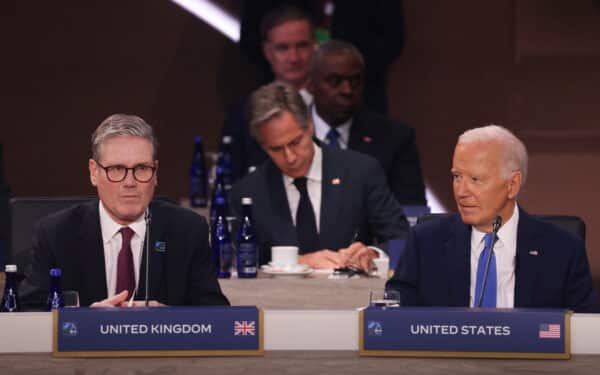NATO is sometimes criticized for being too traditional in its ways – even out of touch – but the choice of speakers at the Stratcom Dialogue in Latvia earlier this year tells a rather different story.
Alongside key figures from the government and military were experts from the fields of psychology and philosophy; the theme of the conference was that an understanding of human behaviour is essential for an effective strategic communications campaign.
In 2010, the Government set up a Behavioural Insights team – also known as the Nudge Unit – tasked with improving public services and saving money by applying learnings from behavioural psychology. There are now established nudge teams in Australia, Singapore, Germany and the US, which is testament to the UK team’s impact.
The thread which underpins behavioural science is that humans cope with the vast number of stimuli they encounter every day by using shortcuts; we associate new information with existing patterns, or thoughts, rather than creating new patterns for each new experience and this fast, automatic thinking leaves little room for critical questioning of the thought process. This means we are prone to predictable behaviour and allows the Behavioural Insights team to ‘nudge’ people into making better decisions.
For example, a tax reminder letter, which stated that most people living in the recipient’s town or postcode had already paid, resulted in a 15% increase in repayment rates compared to a standard letter lacking this information.
But can the techniques of the Nudge Unit be used to wage a new form of cyber warfare? Can these lessons be applied to strategic communications, thwarting our enemies, or even preventing conflicts from breaking out in the first place?
At the conference in Riga, a prominent neuroscientist explained that the ‘social brain network’, the specialized circuit in our brains which allow us to relate to others, means that we empathise with people if we share the same experiences. A communications campaign, which highlights the similarities between people from different countries or cultures even if they are not immediately apparent – sporting interests or hobbies, for example – could increase empathy.
Meanwhile, a prominent psychologist discussed the ‘overconfidence bias’ – our propensity to feel overly confident about the things we say on social media platforms, reinforced by the echo chamber effect because our followers are, generally, like-minded people. Cookies offer information that we have previously seen or searched for. What we see on our social feeds reflects the views of the people we have chosen to follow so our world view is heavily biased towards our own personal preferences. How do you challenge this world view by offering alternative sources of information?
In the face of the increasing strategic threat from Russia, the UK Government is helping NATO to develop audience-driven communications. NATO needs to remain in control of its narrative to avoid falling prey to misinformation. Its ‘We are NATO’ campaign explains the essence of the organization, reaffirming its commitment to dialogue and peaceful resolution of crises.
NATO needs to harness strategic communications and learn to use them effectively to counter Russian influence. The Russians mastered these techniques years ago. The Kremlin’s meddling in European elections, through social media advertisements and misinformation campaigns, has been well documented, but this is not the core of the Kremlin’s influence strategy.
Russia’s strategy is to influence elections before they take place. It does this by infiltrating and influencing the national conversation long before elections take place; it influences politics, not just the polls. It invests in people: journalists; politicians; academics; business leaders; influencers. What it offers can be relatively modest; the politicians it targets are given recognition in its media outlets, raising their profile, and given access to high-level meetings and to senior business figures, all of which helps burnish their image. Fringe politicians gradually become more mainstream. The investment often pays off; for example, a European parliamentarian who visited Russian-occupied Crimea (all expenses paid) subsequently lobbied to remove sanctions on Russia.
Western governments have the tools to counter these activities. But they can only do this by uniting intelligence with communications. The first step is to expose these activities; the second is to highlight them through a focused information campaign that raises public awareness, using newspaper articles, interviews and other media outlets – both traditional and owned and non-owned social media channels. Shining a spotlight on these activities is a defensive strategic communications strategy; but there is also scope for an offensive strategy, which uses behavioural psychology to communicate key messages to the Russian people, turning the tables.
To ‘nudge’ someone successfully, you must first understand how they communicate, with whom and how they are influenced; you must understand the nuances of their language patterns and how to replicate them, decoding the way they communicate so you can encode your own messages.
For example, ‘Not Another Brother’, an award-winning anti-radicalisation film, made for the Quilliam Foundation by our sister company, Global Influence, was successful because it mimicked the style of typical radicalization films. Unbranded and launched with a #notanotherbrother hashtag, it intentionally replicated the way that IS launched their own propaganda videos, reaching more than half a billion people, many of whom were initially unaware that they were watching a counter-terrorism video.
Once you understand what drives human behaviour, you can devise and implement effective strategic communications strategies. By focusing on behavioural science, NATO has taken the first step in this process; now, it must draw on those learnings to deliver its own form of ‘nudge warfare’ – a campaign in which the ultimate goal is not war, but peace.
Sophie Campbell is an audience analyst at Verbalisation, a leading strategic communications consultancy.



